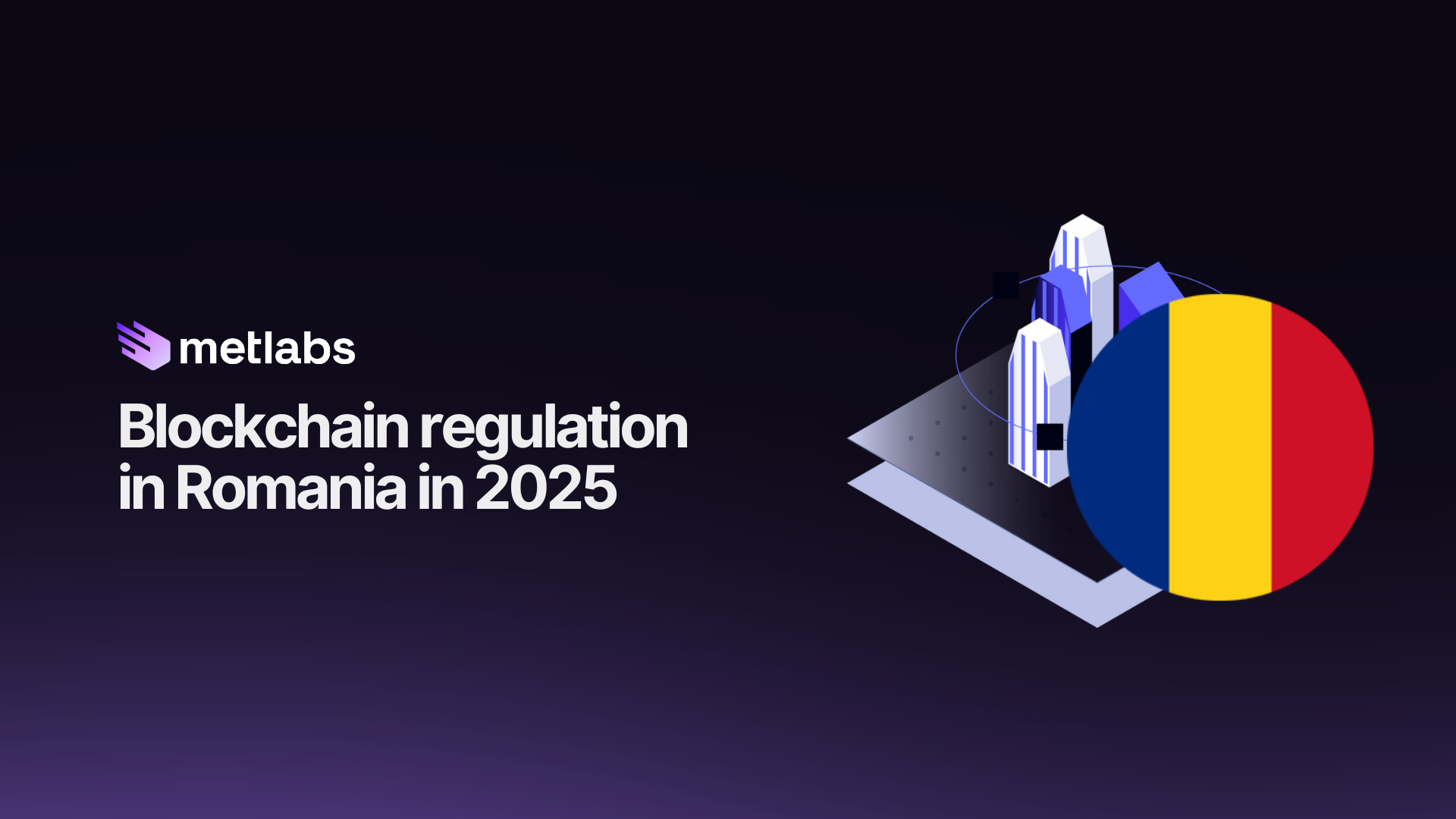The adoption of blockchain technology and asset tokenization is advancing at a rapid pace, but the real engine driving its global development is the existence of a clear, consistent and innovation-friendly legal framework.
Some countries have already established themselves as regulatory benchmarks, establishing specific rules for cryptoassets, DLT infrastructures and token issuance with legal backing. In this article we show you relevant information about blockchain regulation in Romania, which you can use as a guide if you are looking to operate internationally or evaluate different strategic locations.

Current legislation on blockchain and virtual assets in Romania.
MiCA Regulation (Markets in Crypto-Assets Regulation)
Establishes the EU’s first comprehensive legal framework for regulating cryptoasset issuers and service providers (CASPs). Covers stablecoins, utility tokens, electronic money tokens (EMTs), asset referenced tokens (ARTs), and custody or exchange platforms. Requires prior authorization, governance requirements, solvency, transparency, and user protection.
MiFID II (Markets in Financial Instruments Directive II)
Security tokens and cryptoasset derivatives that constitute financial instruments are regulated under MiFID II in Romania. Platforms must obtain an investment firm license and comply with the prudential requirements mandated by the ASF.
National anti-money laundering law
Since the transposition of AMLD5, CASPs in Romania are obliged to comply with national AML/CFT legislation. They must register with the ONPCSB, apply KYC controls, transaction monitoring and suspicious activity reporting.
Cryptoassets Sandbox and DLT Pilot Regime in Romania
Romania participates in the European Blockchain Sandbox and fosters innovation in asset tokenization, stablecoins and DeFi solutions in collaboration with the ASF. Also, Poland participates in the EU DLT Pilot Scheme supporting a Romanian blockchain ecosystem that is showing increasing growth under a more mature regulatory framework.
Tokenization makes it possible to digitally represent real-world assets through blockchain, but for it to have legal value, a regulatory framework recognizing this operation is essential. Romania adopts its own approach, establishing specific rules for the issuance, custody or trading of tokens. In this block we explain how asset tokenization is regulated from a legal point of view, taking as an example an advanced jurisdiction such as Romania.
Regulation of asset tokenization in Romania
Asset tokenization in Romania is regulated through the European legal framework. Tokens representing financial instruments, such as shares or bonds, are subject to the MiFID II Directive and to the supervision of the Financial Supervisory Authority (FSA). These tokens require prior authorization for issuance and trading on regulated markets. In the case of utility tokens and EMT stablecoins (electronic money tokens) or ART (asset referenced tokens), the MiCA Regulation, in force since December 2024, applies.
Romania participates in the European DLT Pilot Scheme, which allows operating market infrastructures on blockchain to trade tokenized financial instruments. In addition, the Financial Supervisory Authority encourages innovation in tokenization through its collaboration in the European Blockchain Sandbox, promoting stablecoin and decentralized finance (DeFi) projects.
Tokenization of non-financial assets, such as real estate or art, has no specific regulation in Romania, but is fully valid under private law. Depending on their structure, these tokens may be subject to civil, tax or consumer protection legislation. DLT technology registries are legally recognized, bringing legal certainty to the ownership and transfer of tokenized assets.
Regulatory bodies and authorities for digital assets in Romania
Financial Supervisory Authority of Romania (ASF)
The ASF is the leading authority in blockchain and cryptoassets regulation in Romania. It grants CASP licenses and supervises CASPs under the MiCA Regulation, token issuance, exchanges, custodians and blockchain-based financial markets. It also applies MiFID II regulations to security tokens.
National Bank of Romania (NBR)
The National Bank of Romania participates in the Eurosystem studies for the possible issuance of a digital euro and assesses the macroeconomic impact of cryptoassets. It collaborates with the ASF in the supervision of stablecoins with potential systemic risk, especially in aspects of reserves, liquidity and governance.
National Office for Preventing and Combating Money Laundering (ONPCSB)
The ONPCSB is Romania’s financial intelligence unit. It monitors AML/CFT compliance by CASPs, manages mandatory registration and receives suspicious transaction reports. It works in coordination with the ASF and other authorities to protect the integrity of the financial system.
Launching a business based on digital assets requires more than just technology: it is also necessary to comply with legal requirements such as licensing, registration and regulatory obligations. These conditions ensure that the business model is viable and sustainable over time, and that it complies with transparency and fraud prevention standards. In this section we explore what licenses are typically required and what compliance criteria blockchain companies operating in Romania must follow.

What licenses and requirements are needed to trade cryptoassets in Romania?
CASP License (MiCA)
With the entry into force of the MiCA Regulation in the European Union, the CASP license is mandatory in Romania for exchanges, custodians, issuers of stablecoins (EMT or ART), service platforms on cryptoassets and any other activity covered by MiCA. The Financial Supervisory Authority (ASF) is the competent authority that grants the CASP license and supervises its compliance. In addition, it collaborates with the National Bank of Romania (NBR) for the supervision of stablecoins with potential systemic impact.
License as an Investment Company in Romania (ESI)
Platforms offering derivative products on cryptoassets in Romania (futures, options, CFDs) must be licensed as Investment Firms, as these products are considered regulated financial instruments under MiFID II. The ASF grants these licenses and requires compliance with MiFID II requirements at both national and European level.
AML/KYC Compliance
Companies providing services with cryptoassets in Romania are obliged to comply with the national legislation on the prevention of money laundering and terrorist financing, which implements the AMLD5 directives. These obligations include the application of KYC procedures, monitoring of transactions, identification of beneficial owners and reporting suspicious activities to the National Office for the Prevention and Fight against Money Laundering (ONPCSB).
Other regulatory requirements
In addition to MiCA and AML/CFT, cryptocurrency companies in Romania must comply with the DORA (Digital Operational Resilience Act) Regulation. DORA requires the adoption of cybersecurity policies, operational resilience plans, ICT risk control, oversight of external technology providers and cyber resilience training programs. Compliance with DORA is mandatory to maintain the CASP license and operate legally under MiCA.
Are you exploring developing your blockchain project in Romania?
At Metlabs we help companies like yours and offer comprehensive support in the development of blockchain projects and tokenization of assets such as real estate, carbon credits, commodities, intellectual property, financial instruments, franchises and more, fully aligned with the blockchain regulation in Romania and international regulatory standards.
Contact us and find out how we can help you meeting all your business model needs, from technical validation and structuring to design, development and implementation of custom blockchain solutions, ready to scale from day one.



